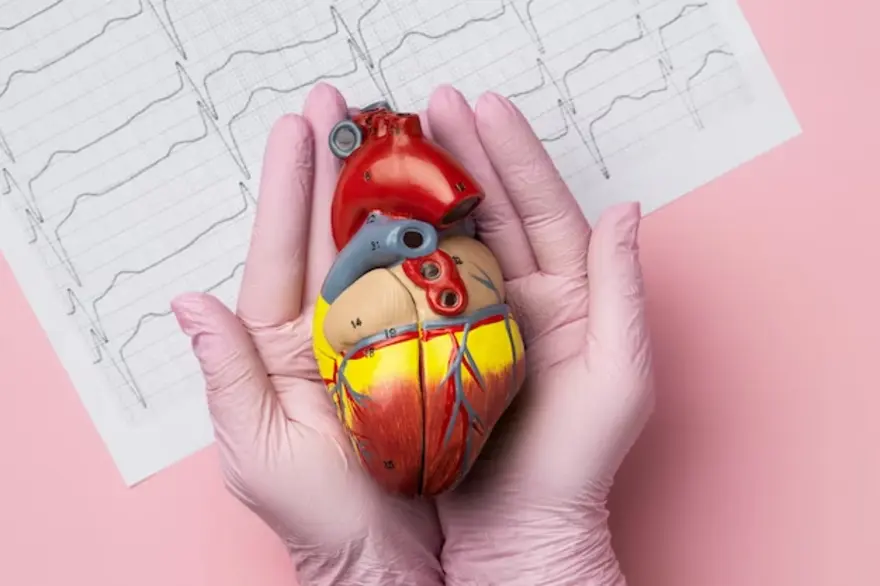Preventive Healthcare
Understanding Premature Ventricular Contractions (PVCs): Symptoms, Causes, and Treatment
1423 Views
0

Imagine your heart's rhythm momentarily faltering, causing an early contraction. It might seem puzzling at first but it can be a sign of premature ventricular contraction(PVC). While often benign, this cardiac problem can cause palpitations and discomfort. Therefore, understanding this condition is important to stay cautious about your heart health. Continue reading to learn the underlying causes of PVC, its symptoms, and potential implications, to recognize and manage this condition properly.
What are premature ventricular contractions?
Premature Ventricular Contractions (PVC) ( also known as Ventricular premature complexes or VPCs ) are irregular heartbeats originating in your heart's lower chambers, the ventricles. Unlike the typical heartbeat initiated by the sinoatrial (SA) node in your heart, PVC occurs when an abnormal electrical impulse starts in your ventricles, causing them to contract prematurely ( ventricular premature beat ). Two consecutive PVCs are referred to as doublets, while triplets are used to describe three consecutive PVCs. This leads to a temporary interruption in your heart's coordinated pumping cycle. PVC often manifests as a fluttering, a skipped beat, or a forceful contraction in your chest.
How do electrical signals control your heartbeat?
Your heartbeat is orchestrated by a complex system of electrical signals. It begins with the sinoatrial (SA) node, your heart's natural pacemaker, generating an electrical impulse. This signal travels through your atria, causing them to contract and push blood into your ventricles. The impulse then reaches your atrioventricular (AV) node, slowing down momentarily to allow the ventricles to fill. Finally, the electrical signal races through the bundle of His and Purkinje fibres, prompting the ventricles to contract and pump blood to the rest of your body.
Who is most likely to have premature ventricular contractions?
While premature ventricular contractions can occur at any age, this condition is more common in older adults, especially those with heart conditions or high-stress levels.
How common are premature ventricular contractions?
PVC are quite common and about 1%-4% of the general population suffers from this unknowingly based on ECG reports.
Is PVC something to worry about?
Not really. While occasional PVC is generally not a cause for worry for those without heart disease, frequent instances may signal underlying health problems or, rarely, pose potential heart risks.
Are PVC life-threatening?
No. Premature ventricular contractions are typically not life-threatening for most people.
What are the symptoms of premature ventricular contractions?
There are several common symptoms of premature ventricular contractions such as:
- Feeling irregular or extra heartbeats.
- The sensation of the heart "skipping a beat."
- Mild chest pain or discomfort.
- Feeling tired or lethargic is a common symptom of premature ventricular contractions when they occur frequently.
- Occasional dizziness
- Mild breathlessness.
- Increased anxiety related to the heart's irregular rhythm.
What does premature ventricular contractions feel like?
You may feel a brief pause, followed by a strong or forceful contraction. Sensations can vary, ranging from mild awareness of your heartbeat to more pronounced feelings of discomfort.
What causes premature ventricular contractions?
There are several causes of PVC, including excessive caffeine intake, electrolyte imbalance, stress, lack of sleep, medications such as decongestants and antihistamines, and structural heart issues. In some cases, the cause of PVC may be unknown.
How are premature ventricular contractions diagnosed?
The early diagnosis of premature ventricular contractions is important. Diagnosing PVC typically involves a combination of your medical history review, physical examination, and diagnostic tests. The doctor may inquire about your symptoms, lifestyle factors, and medical history, looking for potential triggers like caffeine or stress. A thorough physical examination includes listening to your heart with a stethoscope followed by an Electrocardiogram. For a more detailed diagnosis of PVC, other tests like blood tests or stress tests might be conducted. Diagnosing PVC in pregnancy follows a similar process to the general population, but the approach considers the unique circumstances of pregnancy such as hormonal changes and increased blood volume.
What tests can diagnose the causes of PVC?
Commonly employed PVC tests include:
- Electrocardiogram (ECG or EKG): This essential test captures your heart's electrical activity, confirming and evaluating the pattern of premature ventricular contractions.
- Holter Monitoring: Worn over 24 to 48 hours, this portable ECG device helps detect the frequency and triggers of PVC during daily activities.
- Blood Tests: These assess electrolyte levels, thyroid function, and metabolic factors, providing insights into potential causes contributing to PVC.
- Echocardiography: Using sound waves, this imaging technique creates detailed images of your heart, enabling a comprehensive evaluation of its structure and function.
- Stress Tests: Conducted during physical activity, these tests reveal whether PVC occurs under stress.
- Cardiac MRI or CT Scans: These imaging modalities offer detailed views of your heart, assisting in the identification of structural abnormalities or underlying cardiovascular conditions contributing to PVC.
How are premature ventricular contractions treated?
PVC treatment methods depend on their frequency and severity. In many cases, no intervention is required if PVC are infrequent and not causing significant symptoms. Individualized treatment plans are crafted based on a thorough assessment of your health and the specific characteristics and symptoms of premature ventricular contraction.
For more persistent or bothersome PVC, medications like beta-blockers or antiarrhythmics may be prescribed to regulate your heart rhythm. If an underlying condition is identified, addressing that issue may alleviate PVC. In rare cases, catheter ablation (a procedure to correct abnormal electrical pathways in the heart) might be considered for PVC treatment.
How can I prevent premature ventricular contractions?
There are many things you can do to prevent PVC:
- Practice stress-reduction techniques such as meditation, deep breathing, or yoga to minimize stress, which can trigger premature ventricular contraction symptoms.
- Reduce or eliminate stimulants like caffeine and nicotine, as they can contribute to the occurrence of PVC.
- Prioritize sufficient and restful sleep.
- Engage in regular, moderate exercise, which supports cardiovascular health.
- Adopt a balanced and heart-healthy diet, low in processed foods and rich in fruits, vegetables, and whole grains.
- Avoid excessive alcohol intake, as alcohol can trigger PVC in some individuals.
- Ensure proper hydration, as dehydration can sometimes contribute to PVC.
How do I know if I’m at risk of premature ventricular contractions?
The risk of premature ventricular contractions varies. If you experience frequent irregular heartbeats, severe chest discomfort, or have risk factors like stress, hypertension or heart conditions, consult a doctor promptly.
What is the outlook for premature ventricular contractions?
The outlook for premature ventricular contractions is generally positive. For many individuals, occasional PVCs are harmless. Lifestyle modifications, stress management, and, if necessary, medications can effectively manage more persistent cases. Regardless, getting yourself regularly checked by a doctor is recommended.
Can a PVC cause sudden death?
While extremely rare, isolated premature ventricular contractions typically do not lead to sudden death. However, in cases of underlying heart disease, particularly in the presence of other risk factors, PVC may contribute to arrhythmias that could pose a risk of sudden death.
Can other health conditions cause similar symptoms to PVC?
Yes, other health conditions like anxiety, thyroid disorders, cardiac arrhythmias and certain electrolyte imbalances in your body can cause symptoms similar to premature ventricular contractions.
Conclusion
In conclusion, while PVCs are often benign, understanding their potential causes, and symptoms, and seeking timely medical evaluation is essential. Lifestyle modifications, appropriate treatments, and regular monitoring can help manage PVC effectively, providing you with a favourable prognosis for overall heart health. If you are experiencing frequent symptoms of irregular heartbeats and suspected PVC, book a home blood test at Metropolis Healthcare to get accurate reports of your electrolyte levels and metabolic factors. Metropolis Healthcare is held in high regard for its cutting-edge diagnostic services and experienced phlebotomists, making them the number one choice for doctors and hospitals across India.













1701259759.webp)









 WhatsApp
WhatsApp